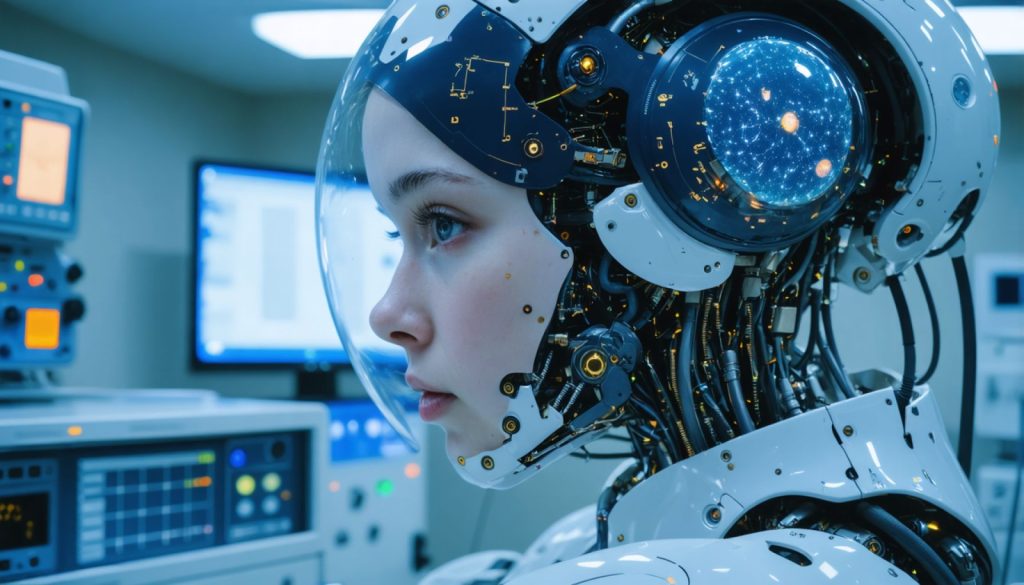
- Artificial intelligence (AI) in healthcare is revolutionizing diagnostics, enabling faster and more accurate disease detection.
- AI algorithms analyze extensive medical data, identifying patterns and conditions that may be overlooked by human practitioners.
- AI enhances the capabilities of healthcare professionals, aiding in critical situations like emergency room diagnostics and radiology.
- The application of AI in drug discovery accelerates the development process by analyzing vast chemical data and predicting compound interactions.
- Despite its promise, AI in healthcare faces significant ethical challenges, including data privacy, algorithmic bias, and the need for transparency.
- AI represents a transformative force in healthcare, promising advancements in personalized and precise treatment while emphasizing the importance of integrating ethical considerations.
- As healthcare increasingly integrates AI, the collaboration between human intuition and machine precision becomes vital for future medical advancements.
In the bustling world of healthcare, where seconds can mean the difference between life and death, a new hero quietly emerges from the lines of code: artificial intelligence. Imagine algorithms that predict strokes before they strike, or alert doctors to a disease lurking unbeknownst to its host. This is not the realm of science fiction but the electrifying frontier of modern medicine.
AI algorithms do more than crunch numbers; they sift through the labyrinth of medical data with speed and precision that leaves the human mind in awe. In the chaotic depths of patient records, AI identifies patterns invisible to the naked eye. This ability transforms healthcare diagnostics, making them faster and more accurate.
Picture a busy emergency room. A young man staggers in, struggling to breathe. Routine examination reveals little, but an AI system swiftly scans his data and identifies signs of a rare condition his doctors might never have considered. Treatment begins immediately, and minutes later, the patient’s life hangs in the balance no more. AI didn’t replace the skilled hands and minds of the doctors—it empowered them.
One striking innovation is AI’s role in radiology. Algorithms trained on millions of images from x-rays to MRIs now assist radiologists by highlighting anomalies that warrant closer inspection. They serve not as substitutes but as tireless partners that enhance human capabilities. As a result, diagnostic accuracy improves and patient outcomes follow suit.
The promise of AI in drug discovery equally dazzles. Traditional methods take years, sometimes decades, to develop new medications. AI accelerates this process by analyzing vast chemical databases, predicting how different compounds will interact with the human body. This efficient forecasting slashes development times, bringing hope faster to those who need it most.
Yet, this technological marvel does not come without challenges. Ethical considerations loom large. There is the question of data privacy, the risk of algorithmic bias, and the critical need for transparency. Integrating AI into healthcare demands not just technical expertise but profound ethical scrutiny—a commitment to ensuring technology serves humanity.
In essence, AI embodies a potential more profound than we can fathom. It does not merely advance healthcare; it transforms it. As AI continues to evolve, it promises a future where diseases are caught before symptoms arise and where treatment is both personalized and precise.
A future crafted with data but driven by the mission to heal, protect, and improve the human condition. Healthcare will increasingly rely on the symbiosis of human intuition and machine precision.
For a world where health is wealth, embracing the AI revolution in healthcare is not just wise—it’s vital. Embrace the change today for a healthier tomorrow.
Revolutionizing Healthcare: How AI Is Shaping the Future of Medicine
Introduction: The AI Miracle in Modern Medicine
Artificial intelligence (AI) has emerged as a transformative force in the healthcare sector, offering a paradigm shift in how medical professionals diagnose, treat, and manage diseases. With its capacity to process large datasets swiftly and accurately, AI addresses critical challenges while enhancing patient care and operational efficiency across the board.
How AI Enhances Medical Diagnostics
Real-World Use Cases
1. Predictive Analytics for Early Detection
AI systems can predict the onset of diseases such as strokes and heart attacks by analyzing patient history and genetic information. This early detection enables timely intervention, potentially saving lives and reducing treatment costs. According to a study in The Lancet, predictive models have improved the accuracy of stroke prediction by 30%.
2. Streamlining Radiological Assessments
AI algorithms assist radiologists by analyzing images faster and with fewer errors than traditional methods. For instance, Google Health’s AI system has demonstrated higher accuracy in identifying breast cancer from mammograms compared to human experts.
How-To: Implement AI in Diagnostic Clinics
– Step 1: Integrate AI software compatible with existing medical imaging systems.
– Step 2: Train staff on interpreting AI-generated insights.
– Step 3: Regularly update AI systems to recognize new data patterns.
Expediting Drug Discovery
The integration of AI in pharmaceuticals has the potential to revolutionize drug development. By leveraging AI to analyze chemical interactions, companies can experience a significant reduction in the time required to bring a drug from concept to market. IBM Watson, for example, uses AI to explore vast chemical databases, predicting compound interactions and identifying potential therapeutic effects.
Market Trends and Forecasts
The AI in drug discovery market is expected to reach $3.88 billion by 2027, growing at a CAGR of 40.8% from 2020 to 2027, as per Allied Market Research.
Ethical and Security Considerations
Data Privacy and Algorithmic Bias
The dependency on massive datasets raises issues around data privacy. Ensuring patient confidentiality while using AI requires robust security measures and adherence to legal frameworks like GDPR and HIPAA.
Addressing Bias
Algorithmic bias is a concern, particularly for minority groups underrepresented in datasets. Industry leaders emphasize diverse data collection and transparent AI processes to mitigate these biases.
Pros and Cons of AI in Healthcare
Pros:
– Improved diagnostic accuracy
– Faster drug discovery
– Enhanced treatment personalization
Cons:
– High initial implementation costs
– Dependence on quality of data
– Ethical and privacy concerns
Actionable Recommendations
1. Invest in AI Training: Equip healthcare professionals with AI literacy to fully leverage technology.
2. Collaborate with Tech Firms: Healthcare institutions should partner with tech companies to refine AI tools.
3. Focus on Inclusive Data: Continuously update AI algorithms with diverse, comprehensive data to reduce bias.
Key Insights and Predictions
As AI technology advances, its role in healthcare will continue to grow. By 2030, we might see hospitals operating with virtual health assistants triaging patients and AI-driven robots conducting complex surgeries. AI-driven preventive care and personalized treatment plans will also become the norm.
Conclusion: Embracing the AI Healthcare Revolution
AI holds the promise of transforming healthcare into a highly efficient, precise, and patient-centric model. Embracing this revolution is not merely beneficial but essential. As healthcare professionals and stakeholders adapt to this change, the ultimate beneficiaries remain the patients who receive improved, timely, and accurate care.
For more insights into the future of technology in various industries, visit IBM or Google.



